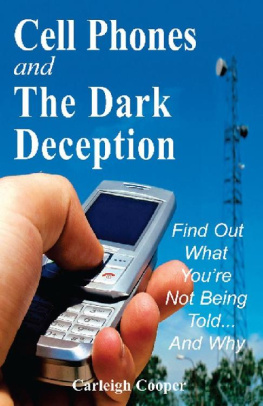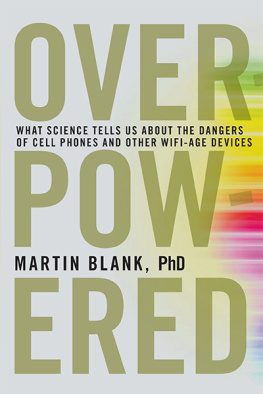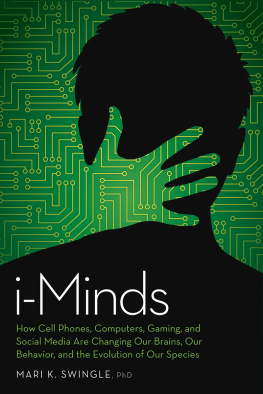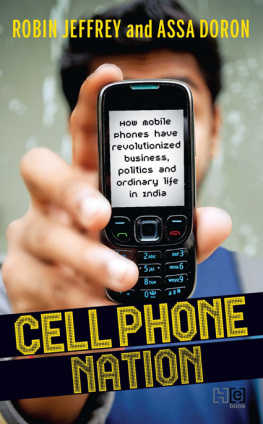Can Stock Photo Inc. / bbbar
Getting Started
Whats the one thing you cant live without?
If you answered your cell phone, youre not alone. 95 out of 100 Americans agreetheir cell phone is an indispensable part of their life. According to a recent survey, 44 percent of us sleep with our cell phones. Over half of us would turn around and head back home if we discovered wed left without our phoneseven if it made us late for work or school.
In twenty short years, cell phones have totally changed the way we communicate, shop, and interact with each other, and the world around us.
In the past, most changes occurred so slowly you couldnt really tell they were happening.
Alexander Graham Bell invented the telephone in 1876. The few people who were in the know considered it a play toy, rather than a useful invention. It was really cool, but no one saw a practical use for it. The spread of the telephone was painfully slow during its first few years. In 1877 Bell had 3,000 subscribers. By 1878 that number had climbed to 10,000 phones in service, and by 1900 there were telephones in over 600,000 homes and businesses. Still, success was anything but certain.
The next generation saw unparalleled growth, and by 1923 Bell Telephone reported there were 14,050,565 telephones in the United States. Phone installations skyrocketed after World War II. Then just as quickly, cell phones killed the landline. Ten years ago, nine out of ten households had landlines. Today (according to a Center of Disease Control and Prevention report) that number has dwindled to approximately two in ten households.
The first mobile phones debuted in St. Louis, Missouri, on June 17, 1946. The network could only handle a maximum of twenty calls for the entire metropolitan area . The first portable phone, that you could actually carry around with you, hit the market in 1983. It weighed two pounds, had a thirty minute talk time before it needed to be recharged, and a hefty price tag of $3995. Fast forward to 1996, cell phones were still waiting for their breakthrough moment. Prices remained high, and the majority of people continued to look at mobile phones as futuristic devices. Over the next few years, prices fell and ownership skyrocketed. Here we are in 2016, and over 90 percent of adults in America own a cell phone, while landlines are well on their way to extinction.
I graduated from high school in 1976, the same year two California inventors, Steve Wozniak and Steven Jobs, were banging around in their garage, pounding out the first Apple computer. By the time I graduated from college in 1980, personal computers had just started to go mainstream. Users had their choice of Tandy , Timex-Sinclair , and Commodore , among other brands. IBM didnt announce the PC until August 12, 1981.
According to the U S Census Bureau just 8.4 percent of U S households owned home computers in 1984. By the year 2000, 51 percent of Americans owned a home computer, and 41 percent had home internet service. Today, 84 percent of Americans own a PC or tablet, and 73 percent of those households have access to broadband internet. Thats a 74 percent increase in computer ownership in just over thirty years. Whats even more remarkable is broadband internet use soared from zero to 73 percent in a twenty-year period.
In 1980, IBM approached Bill Gates, a Harvard Business School dropout, to develop an operating system for their new personal computer (PC). Gates purchased licensing rights to a program called 86-DOS from Seattle Computer Products , and modified it for use with the newly released IBM PC. In return, he received a one-time payment of $50,000 from IBM . Microsoft released the first version of its Windows operating system in 1985. Two years later, Gates made his first appearance on Forbes list of the Worlds Wealthiest People . He has topped the list consistently from 1995 to 2014, and is currently ranked the richest man in the world.
During that short thirty-year period from 1985 to 2015, Microsoft rocketed from a virtually unknown company to the most well-known software company in the world. IBM is still the big kid on the block when it comes to computer hardware, but their mistaken belief that hardware was where the money was at, not softwarecost them hundreds of billions of dollars in profit.
Another Harvard dropout, Mark Zuckerberg, created a website that changed the way over a billion people communicate. Facebooks first release, known as Facemash , was shut down by Harvard University just days after its first appearance. The Harvard-only site, was extremely popular among students, but it quickly sucked up the schools bandwidth, knocking out several of their servers. Students also complained about privacy violations, because Zuckerberg posted student pictures and profiles without their permission.
Since its inception on February 4 th , 2004, Facebook has changed the way users communicate, and share personal, and professional information. In twelve short years, it has gone from a Harvard-only thing to a worldwide phenomenon that helps over 1.2 billion users keep in touch. Currently, 800 million people use the Facebook Messenger app to text back and forth, rather than using device based texting. That number is only going to grow as more people download the app.
Another 500 million people use WhatsApp , an app that lets users text back and forth without incurring SMS charges. In the long run, Facebook Messenger , WhatsApp , and similar offerings are going to totally change the way we communicate. Theyre also going to knock the cellular industry for a loop, as smartphone users continue their current shift away from talk, to text only communication.
Facebook has also revolutionized the way we share information. Every time you post a picture, video, or comment, you allow 1.2 billion potential Facebook users to discover whats up in your private life (depending upon your privacy settings). Five years ago it would have taken a professional investigator a full week to discover the amount of personal information they can learn about you from a five-minute visit to your Facebook Timeline .
When you think about it, thats kind of scary.
A computer program has coaxed us into willingly sharing our most private moments, ones weve been taught to carefully safeguard. And, the even scarier thing isyou havent seen anything yet.
GPS location services already let everyone know where you are, and where you have been. Close-up photos from Google Maps can pinpoint you going in and out of your home, school, place of workeverywhere.
If we arent careful, personal privacy will soon become a thing of the past.
Why all of this talk about computers , software, and inventors in a book about the cell phone? Because theyre all converging into a device so small it fits in our pockets, but so powerful, you could run a large business, or small country from it.
Its crazy, but its trueuntil they implant a cellular chip in our heads, the cell phone is going to continue to change the way we live, think, and communicate.
If youre ready for a glimpse into the future, read on
Mobile Will Change Everything - Again
Our love affair with our cell phones will grow even stronger over the coming years.
A recent study conducted by PEW University says over 44 percent of us have slept with our cell phones. Are you listening Victorias Secret? This could signal an opportunity to market mobile nighties, and other assorted cell phone lingerie.
Honestly, cell phones are changing the way we live, work, shop, receive news and other information. The majority of Americans under age eighteen dont know what a landline is, and have never lived in a home that had one.








